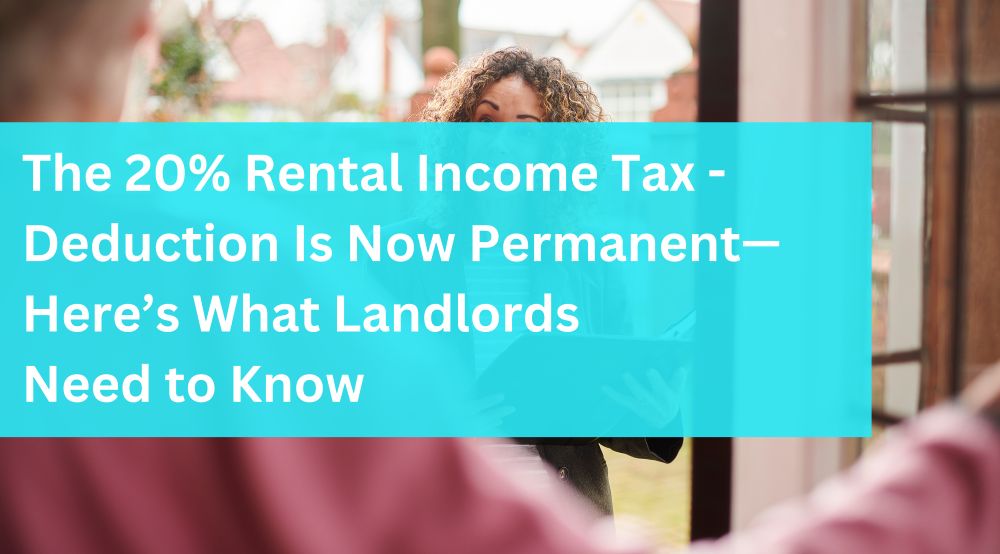If you earn income from rental properties, there's some great news in the latest tax reform: the Qualified Business Income (QBI) deduction—which allows landlords to deduct up to 20% of their net rental income—is now a permanent part of the tax code.
This change offers long-term financial benefits to real estate investors, small landlords, and rental property owners by lowering their taxable income and boosting their bottom line.
Here’s what the QBI deduction is, who qualifies, and how it can significantly improve your rental property cash flow.
🏢 What Is the Qualified Business Income (QBI) Deduction?
The QBI deduction, also known as the Section 199A deduction, was originally introduced through the Tax Cuts and Jobs Act in 2018. It allows qualified pass-through businesses—including landlords—to deduct up to 20% of their net income from business operations.
Until now, the deduction had a set expiration date. Under the new tax reform bill, it is now a permanent feature of the U.S. tax code for qualifying real estate rental income.
💰 What This Means for Landlords
If you earn rental income from residential or commercial properties, the QBI deduction allows you to subtract 20% of that income from your federal taxable income, without needing to spend any extra money or change how you operate.
Example:
Annual rental income (after expenses): $50,000
QBI deduction (20%): $10,000
New taxable income: $40,000
If you’re in the 24% tax bracket, that deduction alone could save you $2,400 annually in federal taxes.
This type of savings can dramatically improve your cash flow, without raising rents or adding new properties.
🔍 Who Qualifies for the QBI Deduction?
You may qualify for the 20% QBI deduction if:
You own residential or commercial rental property and report income on Schedule E of your tax return
Your rental activity is considered a trade or business (which is usually met if you’re actively managing or maintaining the property and your activity is regular and continuous)
Your total taxable income is below certain thresholds (subject to phaseouts above $191,950 for single filers and $383,900 for joint filers as of 2025—but landlords may still qualify above these thresholds with additional criteria)
Good news: Even smaller-scale landlords who own just one or two properties may still qualify, especially if they actively manage the property or use a professional management company.
🔧 What Counts as Qualified Income?
For landlords, “qualified business income” typically means:
Net rental income after expenses (property taxes, repairs, insurance, management fees, depreciation, etc.)
Income from short-term rentals, if they meet certain business criteria
Income from pass-through entities like LLCs or S-corporations (provided the income “passes through” to your individual tax return)
What doesn’t qualify:
Capital gains from selling the property
Interest or dividend income not tied to the business
W-2 income from unrelated jobs
📈 Why This Matters for Real Estate Investors
1. Increased Cash Flow
The QBI deduction puts more rental income in your pocket by lowering your federal tax bill. This can help cover rising property expenses, fund improvements, or be reinvested into expanding your portfolio.
2. Incentive to Keep Investing
By permanently reducing the tax burden on rental income, the federal government is encouraging continued investment in the housing market—a move that could help stabilize supply and demand.
For investors, this means a clearer, more reliable tax landscape for long-term planning.
3. Helps Small Landlords Compete
Not everyone can buy multi-unit apartment buildings. For individual investors and small landlords, every tax deduction counts. The QBI deduction creates a financial edge that supports profitability—even with just one or two properties.
🧠 Tax Planning Tip
If you’re not sure whether your rental activity qualifies as a “trade or business,” or if you're above the income threshold, now’s the time to work with a tax professional. Structuring your rental activity strategically (for example, forming an LLC or increasing documentation of active management) may help you qualify.
And since this deduction is now permanent, you can plan around it with confidence—optimizing your tax strategy year after year.
🔚 Final Thoughts: A Win for Landlords
The permanence of the 20% QBI deduction is a major victory for real estate investors and rental property owners. It rewards those who provide housing and actively manage rental properties while promoting growth in the rental market.
Whether you’re managing a single-family home, short-term rental, or a small apartment building, this deduction helps you keep more of your hard-earned income and invest it where it matters most.
Need Help Managing Your Rentals?
At Beyond Property Management, we help landlords grow their portfolios, maximize returns, and stay ahead of changing tax laws. Whether you self-manage or work with us, we’re here to support your long-term real estate success.
Want to see how the rest of the tax reform impacts homeowners and landlords?






